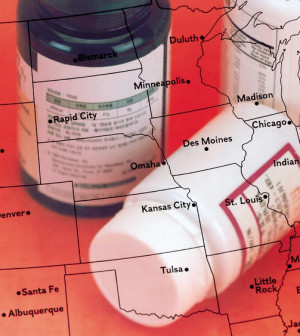- The Best Time of Day to Drink Bone Broth to Maximize Health Benefits
- 8 Ways to Increase Dopamine Naturally
- 7 Best Breads for Maintaining Stable Blood Sugar
- Gelatin vs. Collagen: Which is Best for Skin, Nails, and Joints?
- The Long-Term Effects of Daily Turmeric Supplements on Liver Health
- Could Your Grocery Store Meat Be Causing Recurring UTIs?
- Are You Making This Expensive Thermostat Error This Winter?
- Recognizing the Signs of Hypothyroidism
- 10 Strategies to Overcome Insomnia
- Could Artificial Sweeteners Be Aging the Brain Faster?
Aspirin’s Ability to Prevent Colon Cancer May Depend on Your Genes


Aspirin seems to halve the risk of colon cancer in people with high levels of a genetic enzyme found in the colon, a new study says.
Many questions remain, however, regarding who should take aspirin to potentially ward off colon cancer. The research isn’t definitive, there’s no easy test for patients to take to assess potential benefits, and aspirin can cause serious side effects.
“There is very strong evidence that aspirin reduces the risk of colon cancer, but we’re not yet at the point where we’re recommending that treatment,” said study co-author Dr. Andrew Chan, an associate professor at Harvard Medical School and gastroenterologist at Massachusetts General Hospital.
Still, the new study “provides proof that we may be able to go beyond traditional risk factors to try to determine if someone can benefit from aspirin therapy,” he said.
According to the American Cancer Society, the lifetime risk of colon cancer is 1 in 20. While regular colonoscopies that search for signs of cancer are now recommended for people over 50, about 50,000 people will die in the United States of colon cancer this year, the cancer society estimates.
Scientists have tried for years to determine whether aspirin’s benefits as a colon-cancer prevention tool outweigh the potential for side effects such as bleeding in the stomach. On the bright side, aspirin is one of the most inexpensive drugs available, costing as little as a penny a pill.
While research suggests that aspirin has benefits, Chan said, it’s still not clear exactly how it may keep colon cancer at bay. Chan’s team launched the new study to see if people with colon cancer had higher or lower levels of a genetic enzyme known as 15-PGDH that’s found in the mucous membranes of the colon.
The enzyme plays a role in removing proteins known as prostaglandins that have been linked to colon cancer, Chan said. “If people are lacking this enzyme, aspirin may not cooperate as well with that person’s body to get rid of prostaglandins,” he said.
Most people appear to have the enzyme, Chan said, but it’s not clear how many have levels that would allow aspirin to boost their chances of avoiding colon cancer.
In the study, researchers looked at tissue samples from 270 colon cancer patients. These patients were among nearly 127,900 people whose medical histories were tracked over many years.
The participants were followed in the 1980s and 1990s when daily aspirin therapy was less common than it is today. The study defined aspirin users as those who took at least two 325-milligram (mg.) aspirins a week. While two 325-mg. aspirins a week amounts to more than a daily dose of 81 mg. of “baby” aspirin, which people often take as part of heart therapy, Chan said the difference is negligible.
Those who had higher levels of the enzyme and took aspirin regularly had a 51 percent lower risk of colon cancer than those who didn’t take aspirin. But those who had lower levels of the enzyme only had a 10 percent lower risk of colon cancer if they took aspirin regularly, the study found.
The findings were published in the April 23 issue of Science Translational Medicine.
A test could be developed to detect the enzyme levels to see if certain people should take aspirin to prevent colon cancer, Chan said. Such a screening would require colon tissue that could be obtained during a colonoscopy. It would be safe, Chan said, but the cost is unknown.
Chris Paraskeva, a colon cancer specialist and head of the School of Cellular and Molecular Medicine at the University of Bristol in England, said the study appears to be valid and is “potentially very useful.”
However, he added, “I would not recommend the general healthy public take aspirin without consulting their doctor first.”
More information
For more about colon cancer, see the American Cancer Society.
Source: HealthDay
Copyright © 2026 HealthDay. All rights reserved.










